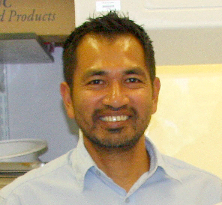报告题目: 定量微生物风险评估
报告人:John Wain、Navy Hong、Dr Pradeep Malakar
语言:英文
单位:东安格利亚大学、联合利华、英国食品研究所
时间:2014年10月09日(14:00~)、2014年10月10日(09:00~)、2014年10月11日(09:00~)
:地点:2103
Course Title: Quantitative Microbial Risk Assessment
Date: Thursday 9th, Friday 10th and Saturday 11th October
Place: Teaching Building 2103, Lin Gang Campus
This 2nd joint Unilever, UEA and IFR international graduate course will introduce the following concepts to graduate students at SHOU
1.Assessing the need for Risk Assessment: Epidemiology of foodborne disease (Prof John Wain)
2.Assessing the Risk Management options for reducing risk for foodborne illness (Mr Navy Hong, Unilever Research)
3.Quantification of risk: Modelling techniques (Dr Pradeep Malakar)
Lecturers
|
|
John Wain work at the University of East Anglia where my research is centred on the use of genomic data in clinical and public health microbiology with a special interest in gastrointestinal infection. Within the translational microbiology group at UEA we are optimising nucleic acid extraction techniques from clinical samples and in collaboration with The Genome Analysis Centre developing bioinformatic analysis to identify and type pathogens for the diagnosis of infectious disease. A major challenge is to predict the antibiotic susceptibility of bacteria and to understand the “normal flora” of a sequencing pipeline. In the past I have: designed and implemented a 2 year teaching programme for public health and clinical microbiology in Nigeria; established the microbiology research laboratories of the Welcome Trust's Oversees Unit in Vietnam to study typhoid fever; run, for five years, a research group at the Welcome Trust Sanger Institute developing sequence based methods for the analysis of drug resistant bacterial pathogens; and directed for three years the HPA's Gastrointestinal Reference Laboratory at Colindale (now Public Health England's GBRU). I also maintain a keen interest in the use of new technology in countries with developing economies |
 |
Navy Hong has worked in Unilever Discover Shanghai for 9 years focusing in microbiology safety. He is leading the microbiology team ensuring product safety across Unilever food design, deploy and supply chain in North Asia and South East Asia & Australia. With supporting great diverse food products in these areas, He is contributing to microbiology safety design/execution in different food categories, e.g. acidified food, low acid canned food, Intermediate Moisture Foods, Dry/Semi-dry food. Therefore he is largely rich in practical experience in microbiology risk assessment, HACCP, hygienic design, category GMP, incident management etc. |
 |
Dr Pradeep Malakar has worked at the Institute of Food Research for 11 years and his research primarily concerns food safety modelling and quantitative microbial risk assessment for a variety of food borne hazards. The financial support for his research activities is derived from both public and private sources. During his career Dr. Malakar has collaborated with several senior scientists working in quantitative microbiology. Problems of particular interest include hazards associated with spore forming bacteria and the impact of variability and uncertainty in pathogenic microbial growth on burden of foodborne illness In 2012, he was awarded a Dong Fang professorship at Shanghai Ocean University by President Pan Yingjie |
Schedule
Thursday (9th October, 4 lectures, John Wain)
14.00 – 14.45 Introduction to Foodborne Bacterial Pathogens
14.45 – 15.30 Antibiotic resistance in the food chain
15.45 – 16.30 Tracking the source of a Salmonella outbreak
16.30 – 17.15 New Technology and the Molecular Epidemiology of Foodborne disease
Friday (10th October, 8 lectures, Navy Hong)
09:00-09:45 The concept of “Risk” and the purpose of using risk assessment in different public/private contexts
09:45-10:45 Example of the use of risk assessment by regulators, i.e. Codex Alimentarius
11:00-12:30 Risk assessment use by Unilever
Lunch
14:00-15:45 Exercise doing a “descriptive risk assessment exercise” of a food safety management situation
15:55-17:30 Exercise doing a “semi-quantitative risk assessment exercise” (using Risk Ranger)
Saturday (11th October, 8 lectures, Pradeep Malakar)
9.00 - 9.45 Introduction to QMRA and modelling
9.45 - 10.30 Primary and Secondary models
10.45 - 11.30 Web based models
11.30 - 12.30 Introduction to probabilistic modelling
Lunch
14.00 - 14-45 Introduction to probabilistic modelling
14.45 – 15.30 Generating random numbers
15.45 - 16.30 Simulations
16.30 - 17.15 Simulations and probabilistic modelling
(食品学院)
